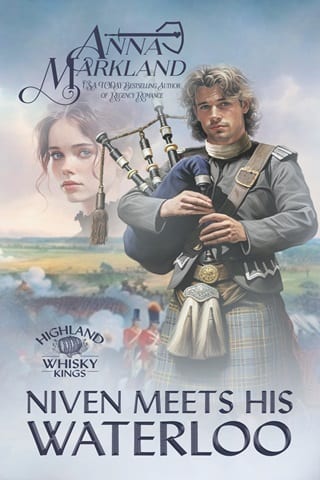Quatre Bras
JUNE 16TH, 1815
H ours after leaving Brussels, and still in his dress uniform, Rowan attended an impromptu briefing given by the divisional commander. As far as he could tell, they were in a farmer's field in the middle of nowhere. The sun was high in the sky. His grumbling belly told him it was past midday.
"We are headed for a place called ," Lieutenant-General Picton explained. "It's a vital crossroads on the Brussels to Namur road that we must not allow to fall into Napoleon's hands."
Despite drinking only lemonade at the ball, Rowan had nodded off several times atop his horse. He didn't know how the infantrymen had managed to stay awake, although they hadn't been at a society event the night before.
However, marching throughout the night didn't help a man keep his wits about him.
"A French column is to the south of ," Picton explained. "Wellington is surprised they didn't occupy the crossroads since they reportedly reached this area before our forces did. They have already begun an attack on the Allied brigades defending the location."
"You mentioned a French column, Sir," an officer said. "Are we to understand it's not the entire French army they're facing?"
"No, it's not. In his despatch, Wellington surmises Napoleon has committed the bulk of his army to attack our allies, the Prussians. Marshal von Blücher's army is to the east of us. We must hurry to the aid of our soldiers defending the crossroads. If the enemy occupies , we'll be prevented from assisting our allies and the French cavalry will be able to attack the Prussian flank."
Less than two hours later, the men of the 32 nd quickly organized themselves into a defensive square south of the crossroads—a maneuver they'd practiced so many times they could probably do it in their sleep. Rowan and the other officers took up their positions inside the square as the men prepared to fire their muzzle-loading muskets at the French cavalry. Their timely arrival relieved the exhausted Dutch brigades who'd been fending off the enemy for hours.
However, it was dusk before the French withdrew, finally unable to take the crossroads in the face of the barrage of heavy balls from the British muskets.
Rendered hoarse from all the smoke from heavy artillery, Rowan was nevertheless able to tell his brothers, "That was the longest afternoon of my life."
"And mine," Ash replied, wiping his brow.
"Mine too," Thorne declared.
Hungry, exhausted and grateful they were all still alive, Rowan chuckled. It seemed things were back to normal with his brothers echoing whatever he said.
Along with the other officers, he saluted the arrival of the brigade commander.
"Well done," Major General Kempt shouted. "We've kept control of the crossroads, but the Prussians have been defeated to the east. Wellington therefore wants the main force to fall back to a village to the north. Bury your dead, then prepare to march."
Rowan looked to the pile of corpses in the center of the square. The survivors had dragged their fallen comrades from the formation as soon as they died. Now, they'd be expected to bury them in a remote corner of the Netherlands. Wishing with all his heart he could bury his face in Daisy's breasts and weep until he could weep no more, he saluted the departing commander, pulled himself together and set about the task.
In Brussels, Niven and Kenneth McKay were practicing the regiment's marching pibroch, Domhnall Dubh , when word came of the immediate departure for parts south of the city. Napoleon had begun his offensive against Brussels. They took turns playing all through the long nighttime march. Niven didn't mind the hardship. The music and the knowledge he was privileged to be marching with a storied highland regiment helped take his mind off Willow, although she was never far from his thoughts. He prayed she knew he hadn't left her in the lurch.
The 32 nd Cornwall Regiment was part of the same brigade but they were far enough ahead that Niven had no opportunity to glimpse the three Halsteads. It was just as well. He'd be tempted to do them violence which would be the quickest way to get himself shot.
If he was to lose his life during this war, he wanted to die doing something worthwhile for his country and his adopted regiment. If playing the bagpipes motivated men to fight harder to stay alive, he'd have done his part.
They learned they were headed for a place called , a strategic crossroads the French were already trying to take. Two hours later, he stood in the middle of nowhere playing the bagpipes while the men of the regiment quickly formed a square around him in response to orders barked by the mounted officers. McKay, the drummers and the standard bearer stood close by.
He should have been afraid as wave after wave of French cavalry attacked, but he was coldly certain this was were he was meant to be. As dead men were pulled into the center of the square by their comrades, he put his heart and soul into his playing, hoping Willow would eventually learn how he'd died.
Despite his standing as a duke of the realm, Kenneth Hawkins felt utterly powerless. His contacts in Whitehall couldn't pass on any news of what was going on in Europe. They insisted he had to be patient.
He didn't pass that message on to his despondent sister. He and his wife had tried everything they could think of to cheer Daisy. Cat hated shopping but had accompanied her sister-in-law to Bond Street on several occasions.
He'd thought his fickle sister would never care deeply for any man, but she'd fallen heavily for Rowan Halstead. Life could be cruel. She was in love with a man she might never see again. He worried about Daisy's sanity if Rowan didn't return from the war.
 Fullepub
Fullepub 



